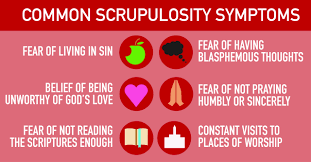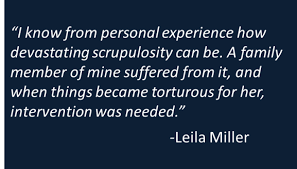Do you have a hard time making decisions? Do you frequently doubt your actions? If so, you may be struggling with scrupulosity. It can be very debilitating and interfere with daily life. In this blog post, we will discuss what scrupulosity is, the different degrees of severity, and the common symptoms. We will also offer advice on how to seek help if you think you may be struggling with this disorder.
Contents
Understanding Scrupulosity

Scrupulosity is a type of OCD that is characterized by religious or moral obsessions and compulsions. Thus, people with this condition often have doubts about their actions and feel a need to seek reassurance from others. Consequently, they may also feel a need to confess their “sins” or perform rituals to reduce their anxiety. Hence, scrupulosity can be very debilitating and interfere with daily life.
Types of Scrupulosity
There are two types of scrupulosity: religious and moral
- Religious scrupulosity is characterized by obsessions and compulsions related to religion.
- Moral scrupulosity is characterized by obsessions and compulsions related to morality.
Degrees of Scrupulosity
There are three different degrees of scrupulosity: mild, moderate, and severe.
- Mild degree is characterized by occasional intrusive thoughts and doubts.
- Moderate degree is characterized by more frequent intrusive thoughts and doubts.
- Severe degree is characterized by constant intrusive thoughts and doubts.
Is It Treatable
Yes, scrupulosity is a treatable disorder. If you think you may be struggling with this condition, we encourage you to seek help from a mental health professional. Moreover, cognitive-behavioral therapy (CBT) is an effective treatment for this condition.
Recognizing Scrupulosity

There are many different types of scrupulosity, and each person experiences it in their unique way. However, there are some common symptoms that people with this condition often experience.
Common symptoms:
- Intrusive thoughts about religious or moral issues
- Doubts about one’s actions
- A need to seek reassurance from others
- A need to confess “sins” or perform rituals
- Avoidance of situations that may trigger doubts
- Anxiety about making decisions
Other symptoms:
- Feeling guilty or ashamed all the time
- Avoiding people or situations that may trigger thoughts about religious or moral issues
- Engaging in rituals or compulsions to try to relieve anxiety (such as excessive praying, hand-washing, or confessing)
- Having difficulty concentrating or completing tasks because of religious or moral thoughts
- Avoiding certain foods, activities, or places because of religious or moral beliefs
- Feeling that you must perform certain actions perfectly or else something bad will happen.
Tests To Recognize Scrupulosity
If you think you may be struggling with this condition, some tests can help you determine if this is the case. For instance:
- The Yale-Brown Obsessive Compulsive Scale (Y-BOCS) is a common tool that helps assess the severity of OCD symptoms. The Y-BOCS includes a subscale specifically for religious and moral obsessions and compulsions.
- The Scrupulosity Subscale of the Maudsley Obsessive-Compulsive Inventory (MOCI-S) is a specific measure of religious and moral obsessions and compulsions.
- The Padua Inventory is another tool that can help assess the severity of OCD symptoms, including scrupulosity.
- The Brown Assessment of Beliefs Scale (BABS) is a measure of the severity of religious and moral beliefs.
- The Wisconsin Inventory of Scrupulosity (WIS) is a measure of the severity of religious and moral scrupulosity.
Predicting Repercussions of Scrupulosity

Scrupulosity can hurt many aspects of life, including personal relationships, professional life, and social life. Let’s see how:
- Personal Life: It can interfere with personal relationships. People with this condition may avoid social interactions or withdraw from close relationships. They may also have difficulty making decisions, such as what to wear or what to eat.
- Professional Life: It can also interfere with work or school. People with this condition may have difficulty completing tasks or meeting deadlines. They may also avoid certain activities, such as public speaking or networking.
- Social Life: It can also impact social life. People with this condition may avoid social gatherings or activities. They may also have difficulty making small talk or engaging in conversations.
Conclusion
Scrupulosity is a treatable disorder that can have a significant impact on personal, professional, and social life. So if you are struggling with it, we encourage you to seek help from a mental health professional.
If you are looking for affordable Online OCD Counseling MantraCare can help: Book a trial OCD therapy session


